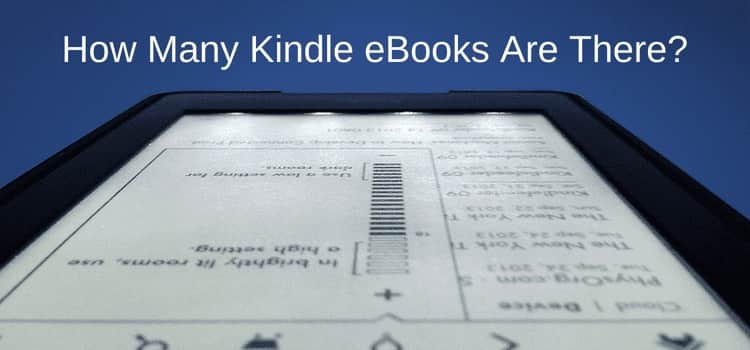
How many books are on Kindle on Amazon?
It’s a number I have been tracking for some years now. In particular, how many ebooks there are in the Kindle Store.
The first Kindle ebooks appeared on Amazon in 2007, and in that year, there were 88,000 ebooks available.
Every year since then, the number has escalated rapidly.
How many books are available on Kindle now?
It has become a guessing game since 2018.
Before then, it was possible to accurately track the number of new Kindle ebooks published each year.
But it seems that Amazon cut off all the avenues to this data midway through 2018.
However, by the best estimates, around one million new ebooks are published annually on the Amazon Kindle Store.
You can see the year-on-year growth of how many books are on Kindle in the graph below.
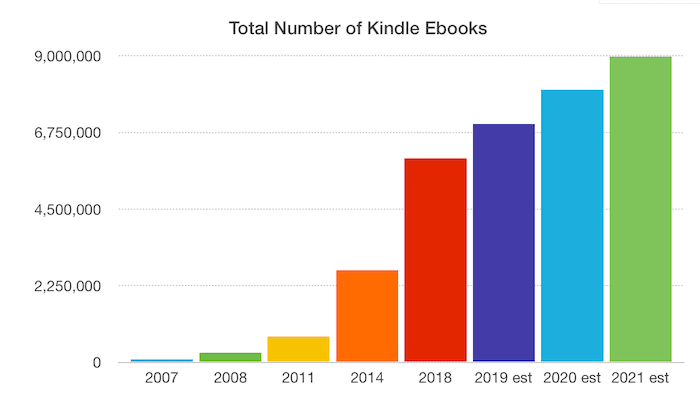
As you can see, up to 2018, I could verify the numbers.
Since then, I can only estimate the total number of ebooks published each year.
I have updated this article many times over the years. (See the end of this article for updates and notes.)
You can read on to the contents of the original article, which includes notes and references that I used to keep track of developments.
Number of ebooks in the Kindle Store (Original article)
Update: Read our newer related article revealing that 30,000 new Kindle ebooks were published on the Amazon Kindle Store in only four days.
With the popularity of ebooks, the question of how many ebooks are available on the Amazon Kindle store has been asked many times.
But Amazon keeps this information about how many ebooks there are on Kindle very close to its chest.
So it has been a difficult question to answer definitively.
But some time ago, Claude Nougat found a clever way to find the answer to this question using Amazon Associates.
You can read about it in his blog post.
At the time, there were, in fact, close to 3.4 million ebooks listed on the Kindle Store.
Using the same method at the time, I found that the total had increased by 20,000 only a few days after his post.

I was not surprised at the number. Nor with his calculation that a new Kindle ebook was published every five minutes.
With the growth in tablets, larger smartphones, and of course, dedicated e-readers, the demand for ebooks is increasing.
As is the motivation for people to write new books and become published authors in the hope of gaining sales in a new and vibrant market.
So yes, you could say that 3.4 million was a lot of ebooks.
What I was more interested in, though, was how many books in total there were on Amazon.
I found the answer to how many books on Amazon using the same home screen search technique on Amazon Associates and was quite astonished at the number I found.
Unfortunately, it is no longer possible to access the data, as shown in the screenshots above. Amazon removed this facility from Amazon Associates a few years ago.
48.5 million books on Amazon
That surely must be somewhere close to every single book in existence. Perhaps it includes many out-of-print books.
Or give or take a few ancient papyrus scrolls and stone-carved tablets.
It also says that no matter what anyone thinks, believes, or tries to deny, Amazon has built a book sales and distribution empire. So it can, will, and does control the book publishing market.
Some see this as a monopoly, which, by many, is the definition of a bad thing. Maybe so, but it’s a fact of life now. So, it is the end of the argument.
But it is interesting to remember where and how Amazon started, way back in the nineties. Amazon built its business on the back of selling book returns from the then six major publishers.
These were books that had been returned because they were unsold in bookstores. Because they had no commercial value, they were destined to be pulped.
It was Jeff Bezos who realized they had some value. Instead of hundreds of thousands of books being recycled to make cardboard packaging, he sold them online.
It all started with book returns
What the big six publishers had always thought of as trash, Bezos and Amazon slowly turned into a huge goldmine.
In fact, perhaps little has changed since those early days of Amazon.
Major publishers still look down on self-published titles as trash, similar to those 90’s returns. But Amazon continues to make money from both and makes the running in the publishing market.
Yes, perhaps Amazon has a monopoly.
But this position of power was handed to Jeff Bezos and Amazon on a silver platter.
The traditional publishing industry that was, and in some ways, still is holding onto the belief that their 19th-century business model will work in the 21st century.
With 48.5 million books available on Amazon, it tells me that they may well be wrong.
It hardly matters, though. It is clear that from the biggest traditional publisher right down to the latest first-time self-published Kindle ebook author, they all need Amazon to sell their books.
The only remarkable statistic in all this is that only 3.4 million ebooks are in the Kindle Store. That is less than a mere 10% of all the titles Amazon has on its shelves. Clearly, the ebook and self-publishing market is still very young.
With the popularity of Kindle devices, Kindle apps, free Kindle ebooks, Kindle Unlimited, Prime Reading, Kindle Singles, free reading apps, and an ever-increasing number of Amazon Prime members, the only way forward is up for Amazon with ebooks.
Even though fewer people buy a Kindle today, phone and tablet reading is increasing for customers with an Amazon account. So the sales of Kindle ebooks continue to grow.
Notes and updates
Update Notes: As you can tell from the article above, it was first published quite some time ago.
But it is still relevant to understanding how Amazon and the Kindle Store have become so omnipresent in the book market, from New York Times bestsellers to one-time Indie self-publishers.
The innovation of combining audio series and Kindle ebooks is likely to be another winning move.
Amazon has created an ebook walled garden.
When you buy a Kindle or Fire tablet, your only choice is to buy Amazon ebooks or access Kindle book deals. By refusing to use the industry-standard .epub ebook file format, Amazon can control its market.
Another interesting observation is that Amazon decided to close off access to the data of the total number of ebooks in the Kindle Store.
It is hard to understand the reasoning behind the move unless Amazon is embarrassed about the ever-increasing number. But it is now impossible to use the technique explained above in the article.
Estimating Kindle Ebooks
There was another way to get an estimate.
For some time, Wikipedia had an entry with a link to the number of ebooks in the Kindle Store.
The last time I could check it, it stated that there were 6 million ebooks in early 2018.
Hearsay estimates of a new Kindle book being published every few minutes would seem entirely realistic and even on the light side of the ledger.
Between 2014 and 2018, the total grew from 3 million to 6 million. This means that 750,000 Kindle ebooks were published each year between the two dates. This equates to one new ebook entering the Kindle Store every one minute and forty-two seconds.
That is certainly, a lot of ebooks.
To put things in perspective, though, it is still a very long way to go for ebooks to equal the number of books Amazon has available for sale.
Unfortunately, Amazon removed access to this data for Wikipedia sometime in early 2019.
Update and new methodology
Thanks to research by Ebookfriendly, there is a way to estimate how many books are on Kindle.
When I say an estimate, it is precisely that, and the results can vary. However, the method seems to return reasonably accurate data in my testing.
The logic behind this method is that Google Search indexes every Kindle ebook.
If you search by an ASIN number, it will always return the correct ebook.
So if Google indexes all Kindle ebooks, it is only a matter of finding out how many there are.
It’s relatively easy to do this using search strings unique to Kindle ebooks.
A simple example is Format: Kindle Edition. This appears on every Kindle ebook page under the title and next to the author’s name.
But you need more unique expressions to make a search more accurate.
The easiest way to find them is to look at the product details of an ebook.
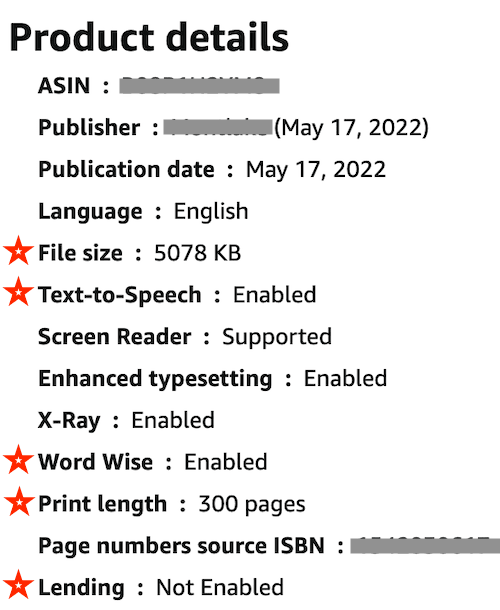
To create my search strings, I used different combinations of the starred items in the list that are all unique to Kindle ebooks.
site:amazon.com “Format: Kindle Edition” “File size :” “Word Wise :” “Lending :” “Print length :”
site:amazon.com “Format: Kindle Edition” “Word Wise :” “Lending :” “Print length :”
site:amazon.com “Format: Kindle Edition” “File size :” “Word Wise :” “Lending :” “Print length :” “Text-to-Speech :”
Google search results for Kindle ebooks
I entered the search strings above into Google Search.
Here are the results for each one.
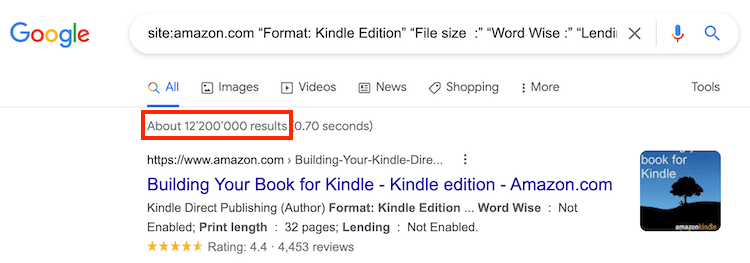
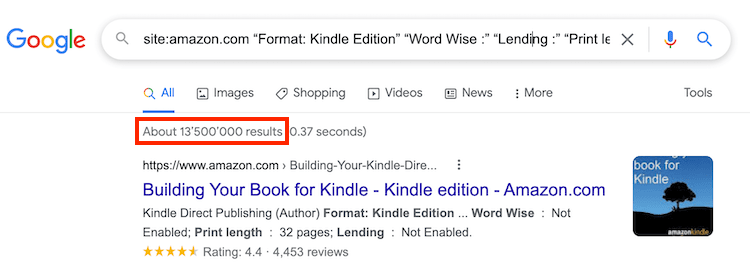
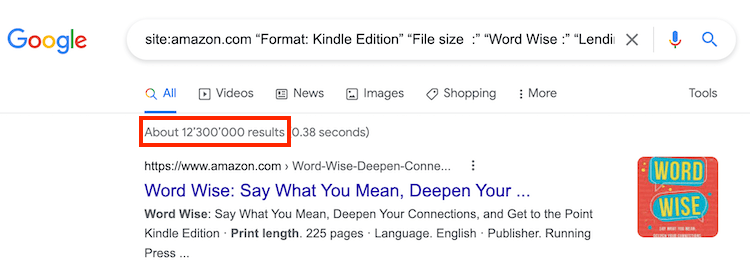
As the last search string contains the most elements, I think it’s probably the most accurate.
I repeated these searches many times, including incognito searches, and the results were consistent.
You can copy and paste the strings above to try for yourself. But you might find variations depending on your location and browser settings.
Updated Kindle Ebook progression graph
As you can see, I have been tracking this data for a long time, and it’s no surprise to me that the progression is continuing.
Because it is so easy to self-publish an ebook on Amazon, the numbers will continue to increase every year.
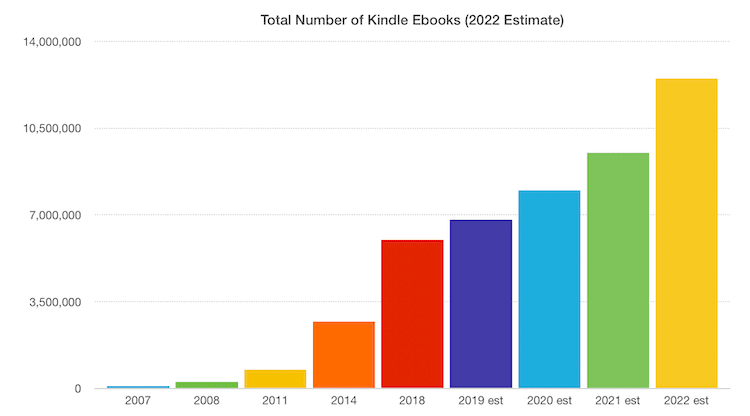
Only Amazon knows the true number.
But I am quite confident that the method I am using now is accurate enough to provide a reasonable estimate of how many books are on Kindle.
Related reading: Update – There are now over 12 million ebooks in the Kindle Store, and the number is rising rapidly by the day.
Share This Article

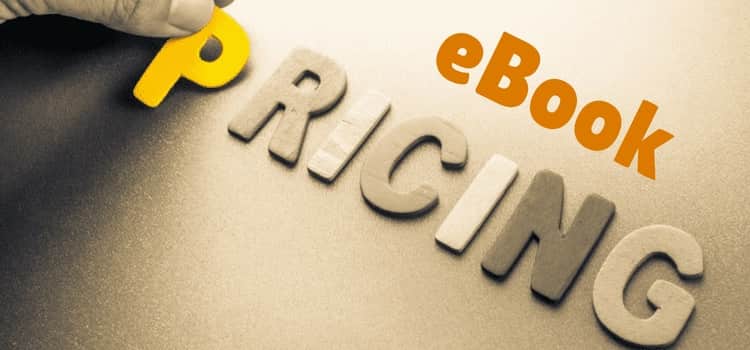

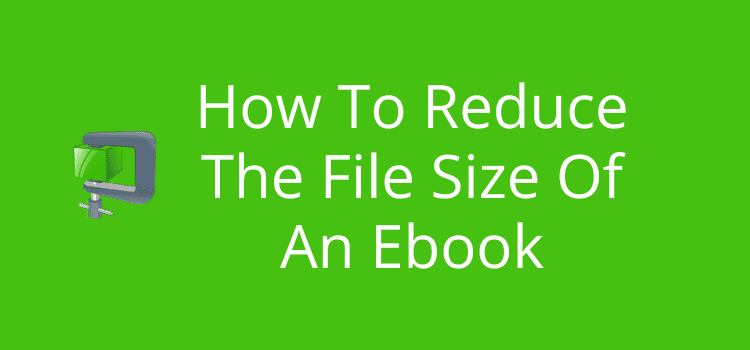
I don’t know how had the situation today is, but several years ago the numbers of books on sale were strongly inflated by what are essentially fake books. As a result, the total number was totally meaningless.
These ‘books’ were automatically created by mashing together a few Wikipedia articles of unrelated topics and printed on demand in case some poor soul failed to realize what they were buying. The long tail of never sold books was populated by books like “Dung Flies, List of prime ministers of King Victor Emmanuel III, and David Scott (cricketer)”
Renaming and combining old, out-of-copyright books was popular too. One could create an essentially infinite number of ‘anthologies’ and ‘best of’ books by randomly combining old short stories of popular 19th/early 20th century authors.
I recall reading similar stories, Psilopa. One that I can clearly remember was an author who published over 1,000 Kindle ebooks in one year. But all are scammers and don’t last long. Readers are smarter than that.
As soon as someone buys an ebook it’s given a ‘Paid in Kindle’ rank. Today I spotted an ebook with a ‘Paid in Kindle’ rank of #5,165,699. Believe it or not it was listed as a ‘best selling in…’ ebook. That means 5,165,698 ebooks are selling better and probably a lot more are not selling at all. I think either your method is wrong or the ‘paid in Kindle’ is giving false results.
48.5 million books! That surely must be somewhere close to every single book in existence […]’
I laughed so hard. Quick query on Wikipedia (based on UNESCO data, in case someone tried to argue Wikipedia is not a reliable source) told me that in just 127 countries surveyed there were about 2,2 million book titles published every year. Let’s assume, pessimistically, that only half of those were new titles. It still gives over a million titles per year. So Amazon would hold, at best, all titles published from about 1970. Yeah, that’s definitely close to every single book in existence.
It’s a pity Amazon has taken away the possibility of checking how many Kindle ebooks there are by using Amazon Associates data. But I would guess that a million new Kindle ebooks each year wouldn’t be beyond the realms of possibility now.
No disrespect to the writer of this article but 50 million titles, PLUS at least 5 million e-titles seems quite a low figure for all english titles. However, even with those numbers, it would take one thousand, five hundred miles of bookshelf space to display, on-end, all those books.
Pity the poor reader who has to try and find your book.
The Amazon site does a good job for book buyers who have a DIRECT LINK to the book they are after and effectively orders and delivers it.
But it is most definitely NOT a marketing site.
Just putting your book or ebook on Amazon doesn’t guarantee a single sale.
For that, a new book author is going to have to invest significant time, effort and money into promoting his book, which will easily exceed the time and effort needed to research, write and edit his book in the first place.
In 2018, it has now become a mammoth challenge to go from being an unknown author to a best-seller which, these days, is considered to be anyone whose one month sales exceed 5000. And they are a tiny fraction of new titles.
How do I get to that page? I’d love to check from time to time – thanks
It is discouraging. That’s why, like it or not (and I’m in the “not” camp), marketing is crucial. Very few writers excel at sales. They’re two different skill sets and personality types. I don’t have a huge budget for advertising so my options are limited.
The problem with so many eBooks being on Amazon is that many of them are terrible…unprofessional…poorly written, and unreadable…and yet they occupy a place on the menu…so that eBook buyers have to pick their way through every title…unaware that maybe your really good read is hiding…waiting to be discovered.
The amount of books on Amazon sets the odds at finding your book about the same as finding the proverbial needle in a haystack.
If “To kill a mocking bird” was first independently published on Amazon today by an unknown author, it would get buried in the book fodder along with many other wonderful books no one will ever know about. Sad.
Your numbers sound right, Will. But a big proportion of new Kindle ebooks are not up to standard, so they fail to gain any traction. Quality still rises, like cream, so there is still an opportunity for good authors who know how to promote their books.
I read recently that 400,000 new ebooks are added every month and the latest number in kindle is 12 million. I despair for my own books against that much competition
Will B Riley